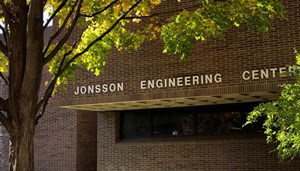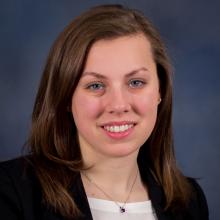
On the Desire to Learn More, Those Golden Days, and Being an Engineer Every Day
Tell us a bit about yourself. How did you choose RPI?
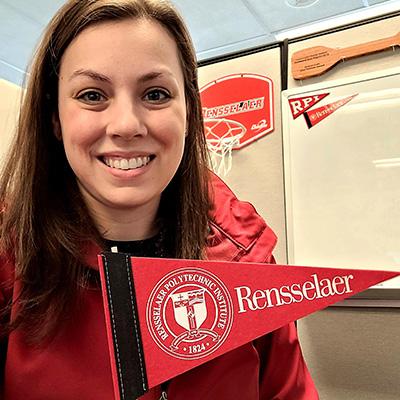
Upstate New York has been home my entire life. I was born and raised in Cazenovia, a small town in Central New York. I attribute my study of engineering to the opportunities the Cazenovia school district and community offered. I’ve been interested in STEM for as long as I can remember and several mentors along the way introduced me to engineering as the application of the science and math I loved. In middle school, I recall job shadowing a friend’s father at an engineering firm, participating in a hydrogen fuel cell competition at GE, and a women in engineering day at Lockheed Martin. But it was probably in high school through the RIT Project Lead the Way program and ultimately being selected as a Rensselaer Medalist that truly led me to Rensselaer and engineering. Graduating high school, I was confident I wanted to be an engineer; however, I was undecided on which program. RPI has a long track record for producing successful engineers across all disciplines, making me ecstatic to enter the freshman class in fall of 2011.
I can’t speak enough praise for programs introducing students to engineering in middle and high school. Today there are so many opportunities beyond even those I was privileged to participate in. From Girl Scout engineering badges to FIRST robotics competitions, I encourage all students to give it a try. It might not be for you, and that’s OK. But you might just find your fit like I did.
While talking Cazenovia, I must also thank the team at Abscope Environmental just down the road in Canastota, NY, for taking a chance on me for my first summer internship, which kick-started my career. It can be extremely exhausting trying to land that first internship but stick with it and continue to build your network.
What was your experience like at RPI? You received a B.S., M.S., two minors, and graduated at the top of your class – how did you manage this feat?
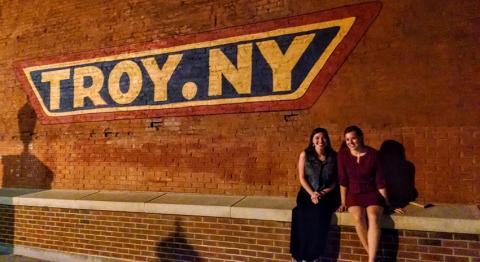
In terms of my academic success, I’ll start with the obvious – hard work. RPI is arduous but if you put in the work, RPI propels you to success. If I wasn’t in class or at a club event, most days you could find me in the Folsom Library 435D study room. Sunday afternoons with my snacks packed, I would race to the library to be among the first through the doors and secure my favorite study room – quiet, spacious, and with the best view of downtown Troy. Office hours were permanently a part of my schedule and my backpack was always loaded to the maximum with textbooks.
However, RPI was more than just classes. My peers and my extracurriculars transformed the student experience. When classes were challenging, you pushed through it together. I recall numerous evenings studying in the dorms (shout-out to my freshman floormates on Nason 2nd floor!), working on homework problems in the student union, collaborating on team projects in the JEC Lounge, and even frantically correcting assignments in the dining hall when your roommate found an error in your assumptions.
After class, the student union was my second home while at RPI. I was heavily involved with Student Senate, Red & White Student Alumni Organization, Newman Catholic Fellowship, Tau Beta PI, Pi Tau Sigma, Professional Leadership Program, and Phalanx. During my coterminal program, I was also a bartender and marketing designer at the Clubhouse Pub in the Union. The clubs and events on campus are absolutely what made the experience special for me. Many of my best friends (and best study partners) were made though these clubs.
Combining it all, passion is at the heart of it. Coming from a small school, I never imaged or set out to be top of the class at an institution of RPI’s caliper. I simply pushed myself to do the best I could with the goal of someday being a great engineer. While the exams could be brutal and I questioned why I wanted to be an engineer at times, seeing the real-world applications kept me coming back to classes eager to learn. As for the double minors, I couldn’t help from being interested in all the cool classes RPI had to offer!
Did Rensselaer prepare you for success?
When you look closely at the Rensselaer crest, the motto “knowledge and thoroughness” is printed at the bottom. To me these words have always helped distinguish a Rensselaer education. RPI relies heavily on its longstanding history of providing engineers a strong foundation of the technical fundamentals. While technology and society rapidly evolve, an RPI engineer can innovate with it. Through my time in Red & White and now in industry, I have crossed paths with countless RPI alumni in all stages of their career doing amazing things. When we reflect together on RPI there is one uniform theme: RPI is tough, but 100% worth it. Every single course and project challenged me in a unique way. I learned the technical fundamentals and the problem-solving skills to support it.
I’m proud to say I recently passed my PE exam. As I jumped back into studying for months leading up to the exam, there were many subjects I needed a refresher on, but all quickly came back thanks to that strong RPI foundation.
I briefly mentioned the student experience in the previous question, but I’ll elaborate here with an anecdote. In high school I recall a coach saying, “she ‘thinks different.’” It wasn’t until I got to RPI that I fully understood what this meant. That different mindset was thinking like an engineer, and my RPI peers were similar to me. Different backgrounds but all engineers. This shapes and defines the culture at RPI – a community of technically minded engineers working together in the classroom, in the community, and on the athletic fields.
You were actively involved in research projects at RPI. Many of our students are interested in research. What advice do you have for them?
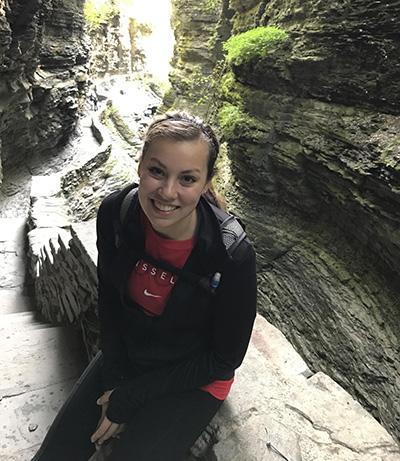
My research adventure began when I decided to pursue the co-terminal program at RPI in which research was a core requirement. As I started to piece together my plan for co-terminal, a few of my professors helped me identify some potential projects and advisers. I selected an interdisciplinary grain growth computational modeling research project with Professor Antoinette Maniatty and Professor John Wen as part of the Automated Control of Microstructure Experiments (ACME) workstream. The project involved development, testing, and analysis of predictive modeling for grain growth in thin films.
While trying to decide which project team to join, I recall thinking – am I really qualified to join this team? I’m not even finished with my undergraduate studies, I have minimal knowledge of the subject area, and these are teams of Ph.D.s working on projects for multiple years. While this was true, it wasn’t important. The desire to learn more unified the research team. My research project pushed me to work with ambiguous goals, acquire new skills, ask questions, design experiments, and collaborate across disciplines.
My advice to students: take time to meet with your academic advisers. Ask if there are projects that need support – big and small. Even small research roles will expose you to new subject matter and broaden your knowledge base. Also important, while I enjoyed many aspects of the project, I also learned some of the things I didn’t enjoy. Research gives you a unique opportunity to “test drive” your interests before graduation and help make decisions on your post-graduation pursuits.
Do you have a special memory or event from your RPI days that you wish to share?
Picking one memory is nearly impossible. My years at RPI and in Troy were filled with the best memories from the time I stepped on campus for my student orientation at Chimney Corners to decorating my cap for graduation day. But to pull just one – let’s talk hockey. Even if you were not a hockey fan as a freshman, I would bet you were by the time senior year hit. I had season tickets throughout my undergraduate years and made every effort not to miss a game. I can still sing every word of the Rensselaer Alma Mater and am truly thankful for “those golden days” and “the friends [I’ve] made at dear old RPI.”
You are working at Corning, an advanced materials company focused on solving hard problems. What do you enjoy most about your role at Corning? What are some exciting projects poised to make an impact on today’s challenges?
Corning has been an amazing place to start my career. You answered my favorite part of Corning in the question – Corning solves hard problems. As an engineer at Corning, I get to be on the teams working on next-generation solutions to these challenging problems. I truly get to be an engineer every day.
Most of my project work has been late-stage manufacturing development with a heavy emphasis on capital expansions. I’ve been involved with the launch of full-scale manufacturing for several new product lines and part of the engineering team for the design and start-up of several new plants both domestically and internationally. No two days are the same. I’ve spent a significant amount of time on the production floor closely engaged with operations teams to drive design concepts to life. My projects have spanned multiple different Corning businesses and product applications.
The technology I am working on is relevant and has direct impact. One example is shortly after the COVID pandemic outbreak, I transitioned projects and began supporting the manufacturing and expansion of production lines for vaccine vial manufacturing. Corning’s Valor glass vials provided enhanced chemical durability and break resistance aiding in the vaccination effort against COVID.
You were in China at the start of the corona virus pandemic and returned to the U.S. on one of the last flights out of the country. What was that experience like?
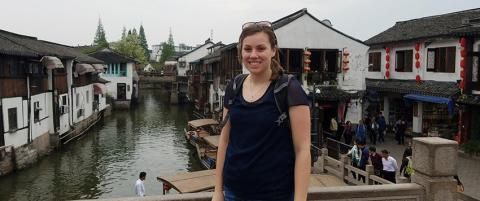
Taking a few steps back: Prior to the pandemic, I was excited to support two major capital expansions for Corning’s Gen 10.5 large-scale display glass. The two new facilities were under construction in Guangzhou and Wuhan, China. As an area lead, I was involved in the equipment design, procurement, installation, and, ultimately, start-up. After years of trips back and forth to the U.S. and long stays in China, the project team was nearing the major milestone of the first glass melting tank light at the end of January 2020. When Wuhan was locked down, I recall sitting in the job trailers on site in a state of confusion. We were aware of the virus but no one understood the severity of the global pandemic that would follow. I spent a few days quarantined in the hotel in Wuhan before evacuating on a U.S. government flight to quarantine in California. Throughout the whole process, I was extremely thankful to work for a company such as Corning. The experience highlighted how much Corning values its employees and will go the extra mile to keep safety at the forefront of decisions.
After a few months back in the U.S., the engineer in me knew I had to get back to finish what we started. In May, I returned to China. After years of work and several unpredictable situations, there was no better feeling than seeing the tank light. Many of the lessons learned for me relate to the project as a whole, not just the evacuation experience. Working cross culturally and on a project of this magnitude challenged me and helped me grow as a young engineer.
You currently serve on the RPI Mechanical, Aerospace, and Nuclear Engineering Department Advisory Council. What do you enjoy about this role?
Serving on the MANE Strategic advisory council is a new role for me, succeeding my colleague at Corning this year. While I have been involved with RPI at Corning for several years through recruiting and student organizations, this MANE commitment has allowed me closer engagement with the academic discussions. I hope to bring the perspective of a young alumna in industry, and manufacturing specifically, to the council. I hope to help ensure RPI maintains its educational rigor and strength in producing strong, relevant engineers prepared for the many different career paths ahead of them. I am excited to see how the council evolves with Dr. Antoinette Maniatty’s leadership.
What do you do for fun?
Growing up with parents in the aviation industry, travel has always been a love of mine. Through Corning, I not only visited cities across the U,S, and globally but immersed myself in their culture with longer assignments. I cooked dumplings in a family kitchen in China, hiked the Seoul city wall in South Korea, marveled over the engineering of the Taipei 101 damper, and searched for beer gardens in Berlin during a pandemic. Even outside of work, I loved traveling Europe with my family and sneaking a few long weekends to catch up with college friends scattered across the U,S.
Back in Corning, I enjoy being outside – hiking waterfalls in the summer, hitting the ski slopes in the winter, or recently giving the new pickleball trend a try. If you swing by my house, I can guarantee I am mid-way through a craft project or home renovation.
What is your message to current Rensselaer students?
I’ve sprinkled so many pieces of advice throughout many of my answers above but my short answer is: say yes. Take advantage of all the resources at your fingertips. Join the club, take the elective class, make the memories. Keep your RPI network close. If you are on campus for four years of undergraduate or eight+ years pursuing a doctorate degree, Troy is a part of you and the experience you are immersed in is one of a kind. You are setting yourself up for an amazing career and future. Enjoy it!
